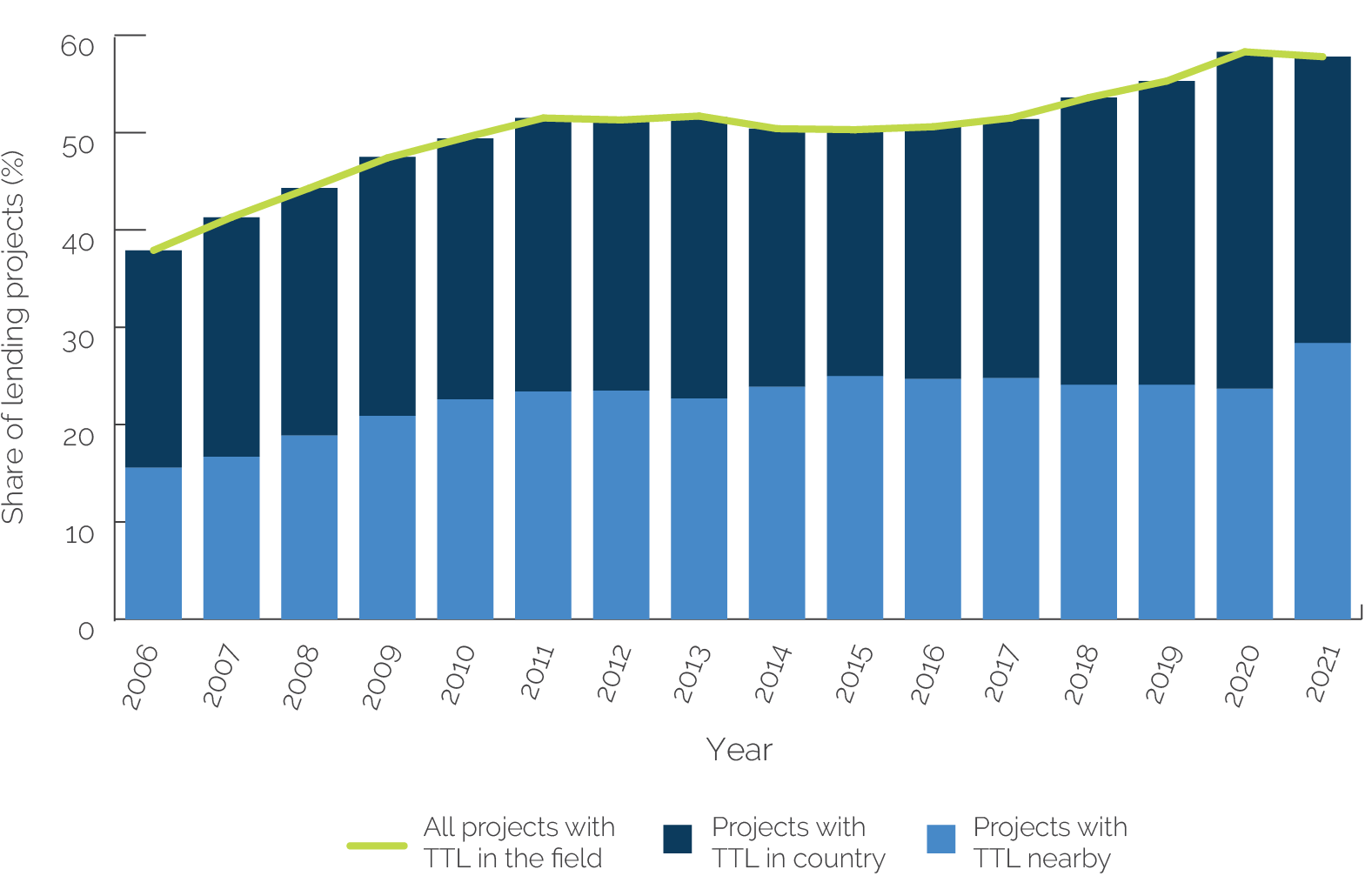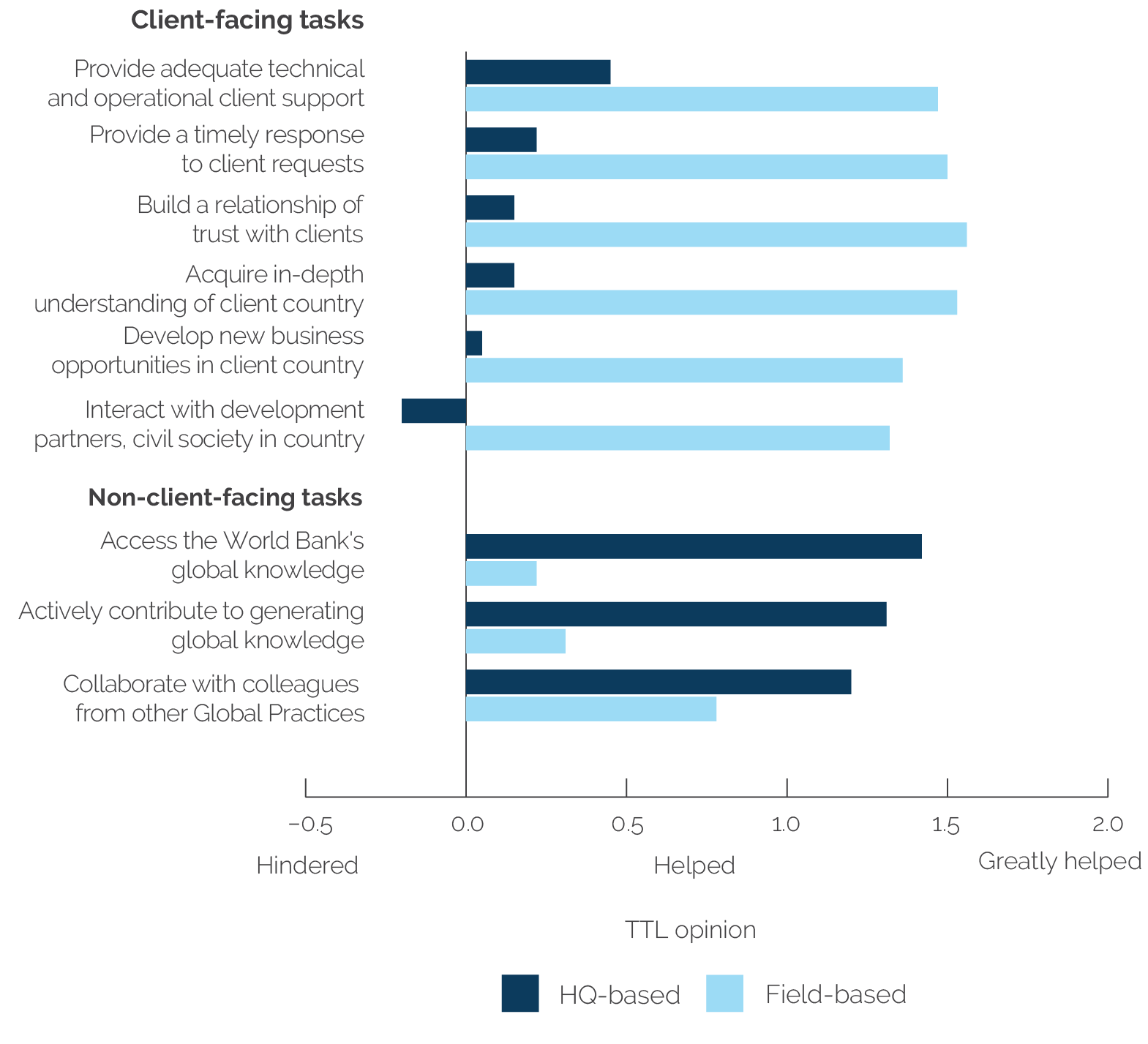Enhancing the Effectiveness of the World Bank’s Global Footprint
Overview
The purpose of this evaluation is to assess the effectiveness of the World Bank’s decentralization efforts from fiscal year (FY)13–21. Decentralization refers to the World Bank’s efforts to expand its global footprint by moving more staff, especially staff with operational and decision-making duties, to the field. The evaluation examines decentralization’s benefits and challenges and makes recommendations to improve the process and outcomes. The evaluation finds that an increased global footprint helped the World Bank build a strong presence in client countries, delivering many anticipated benefits. These benefits include greater responsiveness to clients, more regular operational support for projects, increased trust between World Bank staff and government counterparts, and enhanced collaboration with partners in the field.
The link between field presence and project performance is more difficult to isolate, with qualitative and quantitative metrics garnering inconsistent findings. The World Bank’s decentralization model also carries with it some structural inefficiencies, poses some risks to knowledge flow and global collaboration, and entails certain career development challenges for staff and managers in the field. Some of these inefficiencies are anticipated trade-offs from having a decentralized system, while others were not anticipated but resulted from having several disparate, uncoordinated decentralization efforts and reorganization reforms over the years. The evaluation recommends that the World Bank fine-tune the framework for managing its global footprint and actively seek to mitigate risks and inefficiencies within current budget constraints.
This evaluation is timely because the World Bank will further expand and adjust its global footprint by the mid-2020s. These expanded efforts are motivated by the International Bank for Reconstruction and Development’s capital increase package and International Development Association’s commitments, especially in lower-income and fragility, conflict, and violence (FCV)–affected countries. Therefore, this evaluation takes a critical look back at these past decentralization efforts to inform the new expansion of the World Bank’s global footprint.
The evaluation’s qualitative component covers FY13–21, whereas its analysis of broader staffing patterns looks back to the late 1990s. Several data sources informed the analysis, including case studies on 20 client countries; 227 interviews with World Bank and International Finance Corporation staff, managers, and clients; a task team leader (TTL) survey to compare perspectives on decentralization; a multivariate statistical analysis to explore the association between staff’s field presence and project-level performance ratings; and a quantitative analysis of project, country program, and human resource data. The evaluation focuses only on the World Bank’s professional staff in operations.1 The evaluation does not assess the International Finance Corporation’s decentralization but uses lessons learned from its experience to better understand the World Bank’s experience. The cost of decentralization is not part of the evaluation’s scope. Although it is a critical aspect of decentralization decisions, these costs have been restructured several times in the period covered by this evaluation, and the assessment of decentralization costs in the past would not be meaningful to inform the current context.
Evolution and Trends
The World Bank’s approach to decentralization has continuously evolved over the past two decades in response to commitments to shareholders. Decentralization started in 1997, and since then, the World Bank has sharpened its focus on lower-income and fragile and conflict-affected situation (FCS) countries. From 2008 to 2012, World Bank management abandoned its centralized approach to field staffing, with each Region proposing its own strategy, and elevated a few country offices to Regional hubs, with more sector staff, managers, and operational support staff than other country offices. In 2013, to remove the Regional silos, the World Bank underwent a major reorganization that centralized managerial decision-making within the Global Practices (GPs). The reorganization also slowed the decentralization of staff and decision-making by moving many sector staff back to World Bank headquarters. In 2019, the World Bank adjusted its operational model again, shifting decision-making back to the Regions, and in 2020, the World Bank began expanding its global footprint once more. During these latest efforts, the World Bank announced new corporate targets to increase the proportion of staff in the field.
Since 1999, the World Bank more than tripled its staff field presence, gradually adjusting the global footprint to meet its corporate commitments to low-income countries and the FCS agenda. This rapid expansion of the World Bank’s global footprint was driven largely by the hiring of locally recruited staff (LRS) to country offices (figure O.1). LRS now make up the biggest share of the World Bank’s decentralized staff. In addition, the Africa Region, which has more FCS and lower-income countries than any other Region, employed about one-third of all field-based professional World Bank staff since the early 2000s and has the largest share of internationally recruited staff (IRS) in the field. From 2006 onward, at least one-third of all field-based staff in FCS countries were IRS, on average. However, some FCS countries receive more staff, especially IRS, because international donors prioritize those countries.
Figure O.1. World Bank Staffing Trends, Fiscal Years 1999–2021
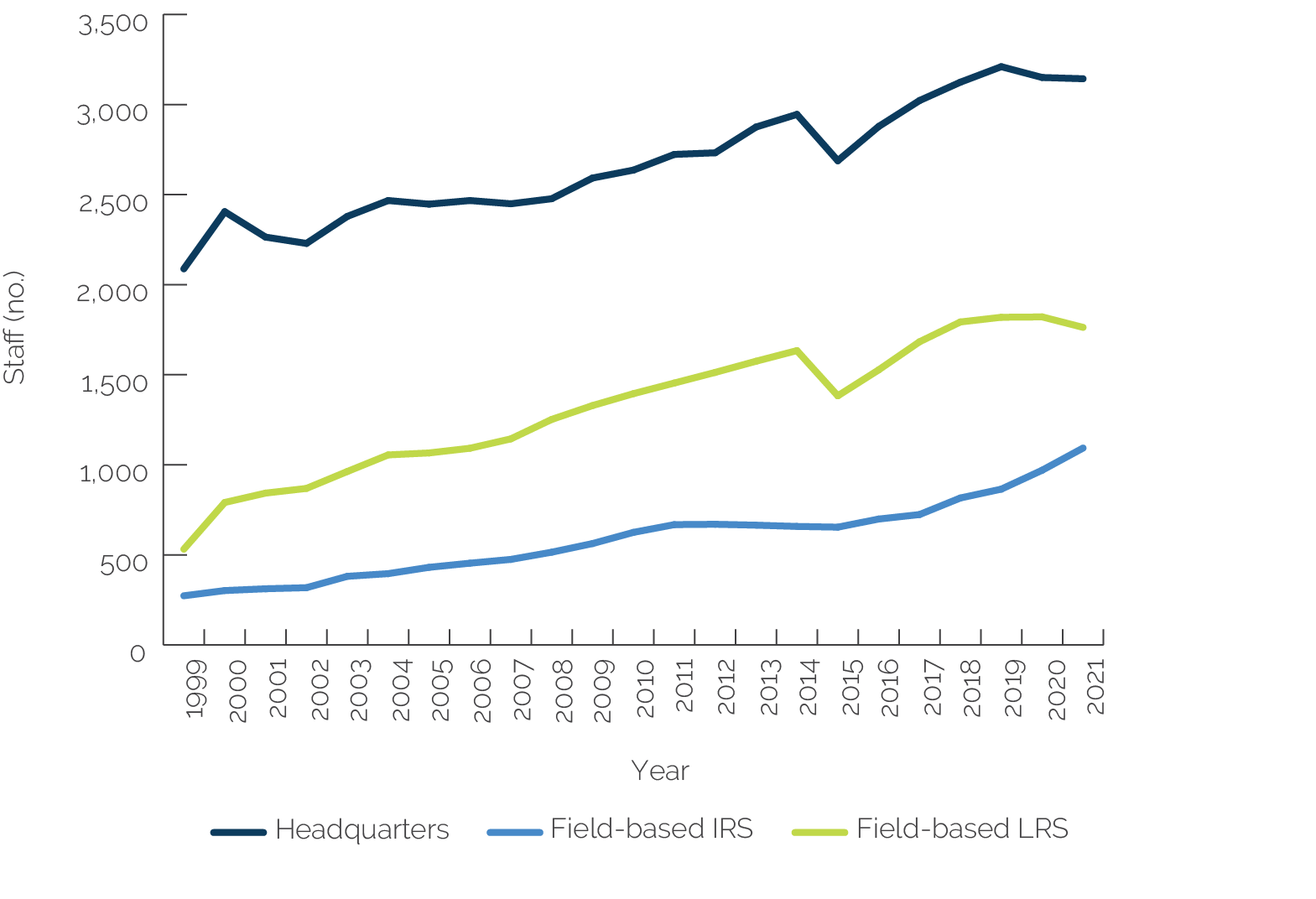
Source: World Bank human resources data.
Note: Includes only professional staff in operations, grade level GE+. Excludes extended-term consultancy contract holders. Excludes staff from institutional, governance, and administrative units. Excludes staff with missing IRS or LRS status data. See appendix A, table A.12 for full data since 1996. IRS = internationally recruited staff; LRS = locally recruited staff.
Project-level decision-making has moved closer to clients, including in FCS countries, but this shift has been slow.2 On average, since 2006, half of all lending projects were managed by the TTL with accountability and decision-making (ADM) responsibilities from the field, but only 28 percent were managed by the ADM TTL from recipient countries (figure O.2). The East Asia and Pacific and South Asia Regions traditionally had the highest share of projects led from recipient countries because these Regions are the farthest from headquarters. The World Bank has also delegated more country-focused advisory services and analytics tasks to TTLs in recipient countries since 2013. The World Bank’s enhanced focus on FCS did not lead to a drastic increase in projects managed from FCS countries, but the trend is upward nevertheless. Since 2018, there is a slow but steady increase of FCS projects managed from the recipient countries.
Figure O.2. Lending Projects Managed from the Field, Fiscal Years 2006–21
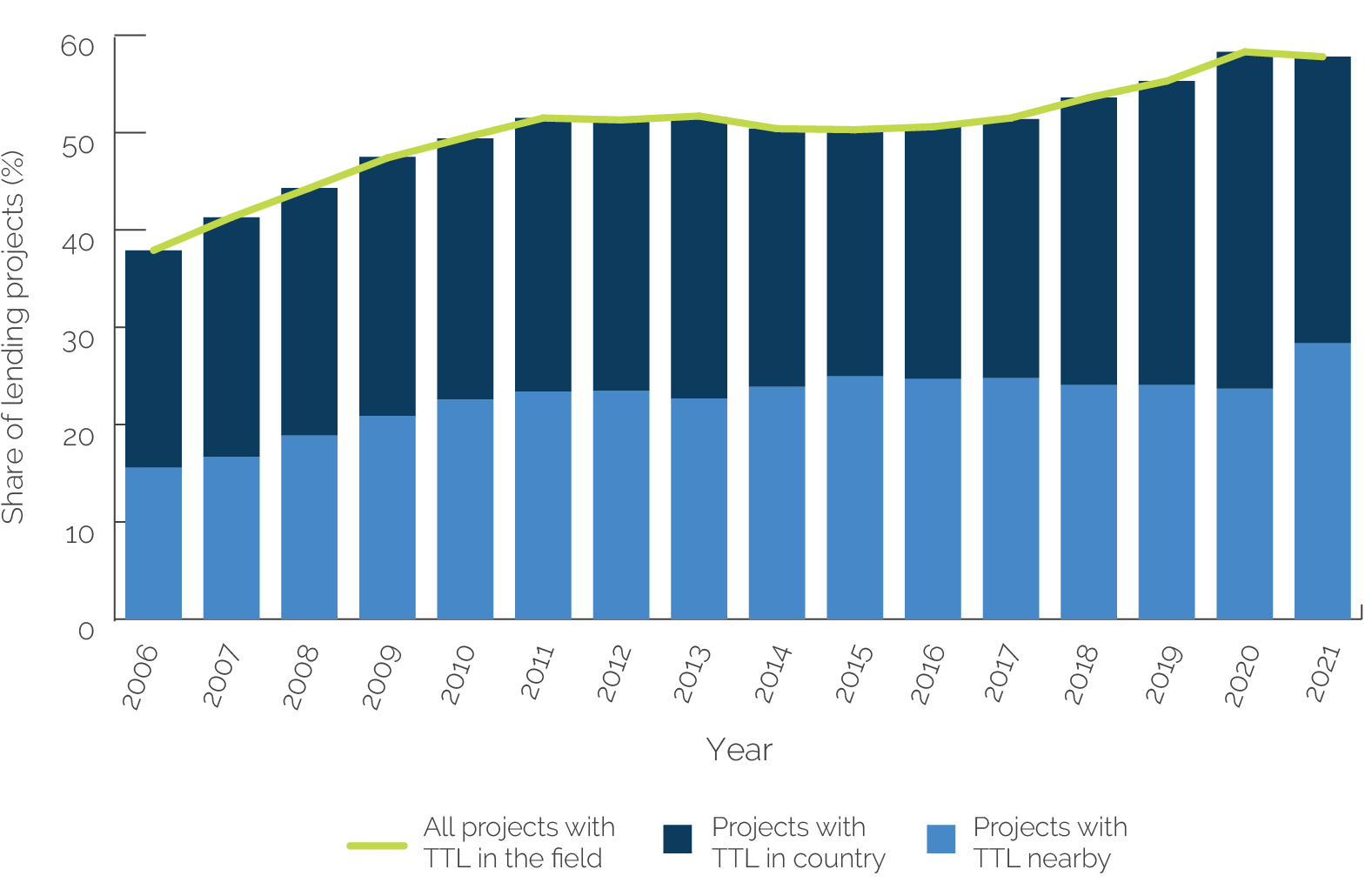
Source: Independent Evaluation Group analysis of human resources and project portfolio data.
Note: The figure indicates the share of projects managed by TTLs in the field. “TTL in country” means the TTL is in the project recipient country; “TTL nearby” means the TTL is not in the project recipient country but somewhere in the same Region. TTL = task team leader.
Benefits
The greater presence of staff in client countries facilitates the World Bank’s client-facing support and contributes to greater client satisfaction, especially in lower-income countries. This evaluation’s analysis of Country Opinion Surveys shows a strong, positive correlation between client satisfaction and the World Bank’s staff presence in lower-income countries. Country case studies show that the proximity of staff to clients enables more frequent day-to-day operational support and project follow-up. This support is particularly important in fragile and lower-income countries, where project counterparts tend to have limited capacity. The TTL survey also shows that locating TTLs in the field makes it significantly easier for TTLs to carry out client-facing activities, whereas locating TTLs at headquarters makes it easier to carry out global knowledge-related activities (figure O.3). Being located in-country helps staff build relationships and trust with clients, which helps the World Bank support institutional reforms, cultivate government ownership over the development process, and coordinate strategic priorities with donors by leading multidonor trust funds. In some countries emerging from political crises or conflict, the World Bank’s presence signals the international community’s support for the state institutions of fledgling governments.
Decentralization helps the World Bank understand country contexts and better tailor products to country needs. TTLs in the field perceive their location as helping them understand local contexts significantly better than TTLs at headquarters perceive theirs (figure O.3). A recent study found that the World Bank’s core diagnostic products influence client countries’ policy priorities because the World Bank involves government officials in diagnosing policy problems and formulating policy recommendations (Masaki and Parks 2020). This evaluation finds that a better understanding of local contexts helps the World Bank tailor traditional solutions to local development needs and thus makes the World Bank’s support to low-capacity countries more relevant for clients.
Decentralization also helps identify new development opportunities and helps international staff to be more well-rounded as development practitioners. The TTL survey shows that 34 percent of headquarters-based TTLs believe their location hinders them from developing new business opportunities, but only 3 percent of field-based TTLs believe the same. This perception was repeated in interviews and case studies, where World Bank staff felt their physical presence or absence in a country influenced the development of new dialogues, operations, technical assistance, and sectoral advisory services. Moreover, decentralization contributes to staff’s personal and professional growth by exposing them to different contexts and development approaches.
Figure O.3. Extent to Which Task Team Leaders Felt Their Duty Station Helped or Hindered Their Work
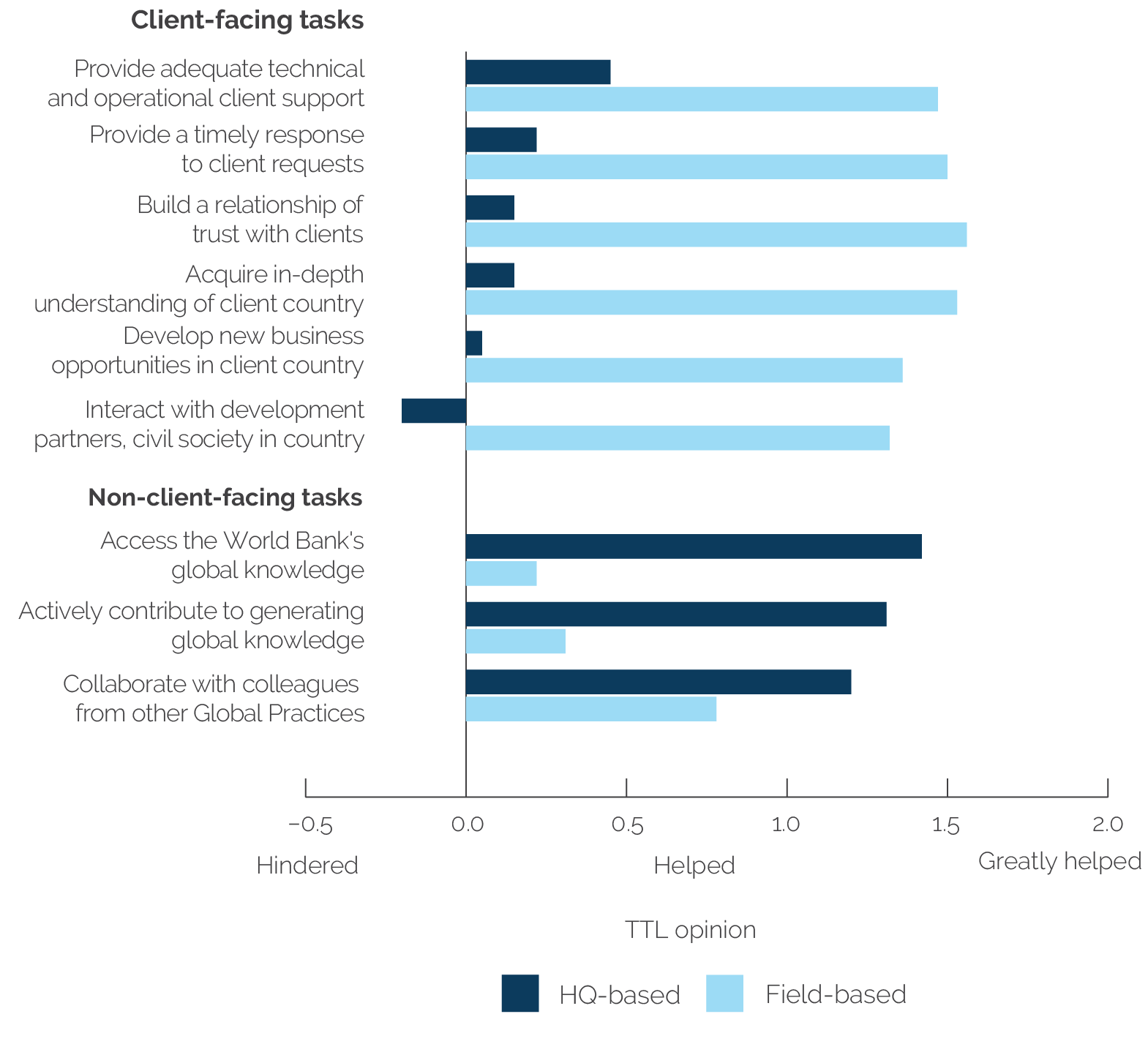
Source: Independent Evaluation Group TTL survey.
Note: Field-based staff includes staff in country and hub offices. Bars show a weighted average of the responses for each answer category. Weights were applied to the number of respondents for each answer; 2 = greatly helped, 1 = helped, 0 = neutral, -1 = hindered, -2 = greatly hindered. Average scores are shown. HQ = headquarters; TTL = task team leader.
The World Bank’s preexisting field presence, strong sector knowledge, and client relationships facilitated its early coronavirus (COVID-19) pandemic response and ensured business continuity during the pandemic. The underlying factors for success were in-country staff’s prior relationships with clients built through years of collaboration and deep sectoral knowledge. These relationships contributed to faster COVID-19–related project preparation and implementation. In some cases, the presence of local staff allowed the World Bank to continue to operate and carry out missions even after the pandemic began.
During the COVID-19 crisis, the World Bank also became better at communicating virtually with clients and within the organization, bringing field and headquarters staff closer. The greater use of virtual communication also to some extent improved country office staff’s access to learning events that are offered at hours more suitable for many field staff. However, for clients with gaps in digital development, especially in fragile countries, transitioning to virtual work was not without challenges.
The quantitative analyses could not corroborate clear and systematic links between staff location and project ratings despite qualitative data indicating that field presence contributes to improved project performance. The study found that an IRS TTL’s field presence has a positive but relatively weak association with project ratings in FCS countries and a relatively strong but negative association with project ratings in non-FCS countries, as measured by the Independent Evaluation Group’s ratings of the World Bank’s quality at entry, quality of supervision, and project outcome ratings. Meanwhile, the field presence of LRS TTLs appears to be more beneficial in non-FCS locations than in FCS locations. Likewise, field presence does not necessarily affect proactivity—TTLs, regardless of their location, are equally proactive in dealing with problem projects.
Challenges and Inefficiencies
There is scope to clarify the expected outcomes of decentralization and fine-tune the framework for making global footprint decisions. The corporate field staffing targets help expand the World Bank’s field presence but do not guarantee that decentralization is tailored to country and program needs or applied to areas where it can bring the most benefits. The lack of explicit objectives and principles on which to anchor decentralization tends to make its implementation less intentional, leading to inefficiencies and missed opportunities. One exception is the Bank Group’s FCV strategy for 2020–25, which links the World Bank’s staffing needs to the scaling up of financial support in FCV-affected and low- and middle-income countries. However, without more elaboration on the type of staff needed and where they should be deployed, many FCV-affected countries still lack important staff skills. This is also linked to the World Bank’s challenge in attracting staff to these more “difficult” countries.
Decentralization’s current model contributed to an unanticipated human resource bias toward countries that host country directors. In multicountry Country Management Units (CMUs), GPs and Regions often locate IRS, including managers and program leaders, in the primary country of the CMU with an assignment to cover all countries in the CMU. As a result, the World Bank concentrates the largest share of field-based professional staff in a few countries with a country director presence. However, an analysis of the World Bank’s operational support shows that this model may not be working the way it was intended. For example, countries without country directors in the CMU receive little support from other CMU countries, instead relying heavily on operational support from headquarters. The work program planning and budgeting process, which is conducted to tailor the staffing to a country’s portfolio, does not seem to guarantee adequate and timely staffing support to this group of countries. A vast majority of interviewees, including country managers and country directors, also confirmed this resource allocation bias and their awareness of the issue. Case studies from smaller countries without country directors almost always revealed examples of an important project or business line in a Country Partnership Framework underachieving or being delayed because the right expertise was not available in the country, and the country could not secure timely support from the CMU or a nearby hub.
The decentralization of decision-making to the field carries with it some inefficiencies and missed opportunities. The widespread co-TTL model is less effective when the TTL with ADM responsibilities is not based in the client country. Interviewed clients generally feel that having a TTL with decision-making powers in the project country significantly reduces project delays, speeds up project-related actions, and helps the World Bank explore new business opportunities. Therefore, designating country-based staff as co-TTLs is insufficient for ensuring the World Bank’s timely support to clients during project implementation unless the co-TTL also has ADM authority. The multivariate statistical analysis also suggests that having the TTL in the project’s recipient country may be associated with improved project performance and outcome ratings more than having a non-TTL project team member. The evidence also indicates that locating practice managers in the field is less beneficial when most of their staff are not also in the field and when they manage a wide geographic area.
Decentralization also poses risks to the global knowledge flow and potentially weakens the World Bank’s organizational cohesiveness and shared culture. Most of the World Bank’s knowledge management takes place from headquarters, where there is greater access to resources for knowledge generation, curation, and sharing. As a result, this knowledge is tailored more to headquarters staff. Similarly, staff say that formal or explicit knowledge generated by field staff, such as country-focused studies and assessments, is less valued by their peers and less frequently curated for global use than headquarters-generated knowledge, although this is difficult to measure objectively. Also, many field staff, especially LRS, feel they miss out on professional networking opportunities, which can constrain their professional growth and career development. The 2020 realignment and other human resources policy changes since then are likely to reduce the flow of IRS between headquarters and Regions. Coupled with local staff’s limited exposure to global knowledge and networking opportunities, this may, if unmitigated, contribute to fragmentation of knowledge and dilute the World Bank’s common corporate values and culture.
Attracting international staff with strong technical, operational, and soft skills to field posts is difficult in many FCS and lower-income countries. The evaluation finds that to provide quality support to clients, field staff must have the right combination of hard skills—such as technical and operational abilities—and soft skills—such as leadership and communication abilities and the willingness to work in difficult country contexts. The World Bank has recently taken steps to make postings in FCS countries more desirable by offering better global mobility benefits, but staff still perceive, often incorrectly, that these posts are harmful for their career progression. Moreover, the World Bank’s relocation and family support in field countries, especially countries with difficult living conditions, remains inadequate.
The World Bank also dedicated inconsistent efforts toward the professional development of LRS. Since the late 1990s, LRS have made up the largest proportion of staff in most World Bank country offices. Most of them have worked in World Bank offices for many years and gained seniority and substantial experience during that time. A handful of LRS transition into IRS positions and move out of the country, but for the majority who remain in the country, the World Bank offers few options for professional growth. Compared with its recent efforts to encourage IRS deployment in FCS, for example, the World Bank has not focused sufficiently on the role and potential of LRS, on which many FCS countries depend. The World Bank’s inconsistent efforts to support the professional and career development of LRS is a missed opportunity to strengthen the World Bank’s global footprint.
There is a widespread perception among World Bank staff that field postings hinder career progression, but data on recent staffing trends does not support such beliefs. Staff commonly believe they will diminish their prospects for promotion or gaining a position at headquarters if they accept a position in “difficult” field locations. Nearly 70 percent of field-based TTLs reported that decentralization reduces global networking opportunities for field-based staff in the TTL survey.
Contrary to these perceptions, evidence shows that field assignments do not hinder staff promotions or future assignments in headquarters. Promotion rates for most field-based IRS are generally higher than for headquarters-based staff at the same seniority levels. Meanwhile, 41 percent of IRS based in FCS locations in Africa in FY13 had moved to headquarters by 2021, which is higher than the movement of IRS to headquarters from FCS locations in other Regions. That being said, overall, IRS staff in FCS countries were, in fact, more likely to remain in their Region than staff initially located in non-FCS countries.
Recommendations
This evaluation suggests that the World Bank fine-tune its approach to managing its global footprint and mitigate decentralization’s most apparent inefficiencies within current budget constraints.
Recommendation 1. The World Bank should refine its current approach to managing its staffing global footprint by clearly specifying decentralization’s expected outcomes and adopting principles to guide and adjust decentralization decision-making based on evidence.
- Adopt clear principles to guide decentralization’s decision-making. Such principles would help Regions and GPs to tailor and fine-tune decentralization decisions. These principles could include, for example, the following:
- Ensuring that decentralization decisions are not only informed by immediate country program needs but are also aligned better with countries’ medium-term needs (for example, more aligned with Country Partnership Frameworks). This will improve the predictability of the staffing support that countries can expect to receive and allow a more nimble and timely deployment of staff.
- Prioritizing the location of project TTLs with decision-making authority in the recipient countries or empowering country-based TTLs with ADM responsibilities. The World Bank could do this by delegating more project-related decision-making powers to staff in client countries, including delegating more project ADM responsibilities to LRS and experimenting with alternative models to project task management.
- Ensuring that staff deployed to multicountry CMUs adequately support non-country-director countries of CMU.
- Adopting a more flexible approach to practice manager placement that balances the GP’s needs with Region- and country-specific needs. Locate practice managers close to their staff to ensure regular and timely access to the staff they supervise. This could also include experimenting with and reinforcing virtual solutions to bring Regions and sectors closer where the situations are less clear-cut.
- Monitor and manage global footprint expansion more actively. Devising a light-touch monitoring, evaluation, and learning approach that collects evidence on key aspects of decentralization would assist in making timely course corrections and calibrating the global footprint based on country needs, corporate priorities, and Regional dynamics. The mitigation of decentralization’s key challenges should be one important aspect to monitor. For example, the World Bank could monitor and assess the extent to which the recent changes to the career framework and the benefits structure are achieving the expected results, particularly with respect to improving global mobility, such as removing key barriers to staff mobility and attracting qualified staff to low-capacity or FCS countries.
Recommendation 2. The World Bank should mitigate the risks to knowledge flow brought about by decentralization and put in place safeguards to avoid developing country and Regional silos.
- The World Bank could tailor its knowledge management mechanisms better to field staff’s needs and ensure that knowledge produced in the field flows to other field locations and to headquarters. Improving the mechanisms for curating and sharing of knowledge produced in the field and investing in virtual and in-person channels for networking and knowledge sharing would facilitate this process. The headquarters-focused knowledge management approach might also need revisiting.
- The World Bank should continue to promote staff mobility by rotating IRS between headquarters and the field and increasing cross-support opportunities for LRS. These efforts would enhance knowledge flow and ease the risk of the World Bank developing country and Regional silos.
Recommendation 3. The World Bank should establish clear and structured paths to systematically promote LRS professional and career growth within its overall approach to improving the effectiveness of its global footprint.
- Opportunities for professional and career growth could include (i) virtual or in-office development assignments or cross-support opportunities in headquarters and satellite offices; (ii) assignments on project teams in other countries within the same Region; (iii) provision of adequate reentry guarantees for LRS who successfully compete for third-country national positions in other countries; (iv) temporary job swaps among LRS in different countries, possibly using the third-country national model; (v) mentoring programs designed specifically for LRS to build LRS capacity and facilitate their immersion into the World Bank’s corporate culture; and (vi) networking opportunities, including virtual ones, to connect LRS to colleagues and managers at headquarters and in other Regions.
Acting on these recommendations would maximize decentralization’s benefits while safeguarding knowledge flow and the World Bank’s global nature.
- In World Bank terminology, professional staff in operations include staff grade level GE+ (excluding extended-term consultancy contract holders) and exclude staff from institutional, governance, and administrative units.
- Task team leaders are used as a proxy for decision-making because they have accountability and decision-making responsibilities for projects.



